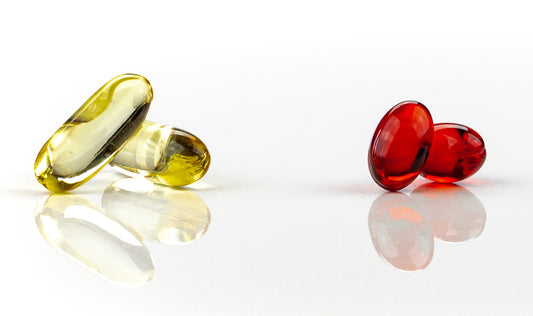-
Say Hello to the Oil that Blows Fish Oil Right Out of the Water.
Unlike Fish Oil, Krill Oil naturally provides the essential Omega-3 fatty acids EPA and DHA, along with Astaxanthin—nature’s super antioxidant, which helps promote healthy joints and supports hearth health. Krill Oil also comes in a smaller soft gel capsule and has reduced a reduced fishy odor and aftertaste.
-
There’s Plenty of Other Fish in the Sea - But We Choose Krill.


Improve Cognitive Performance, Support a Healthy Heart, and Boost Antioxidant Levels.

"BalanceGenics is the best in the business. I love their products and customer care!"
- Jeff S, BalanceGenics Customer
Power On with Natural Cellular Energy
-
Ultimate Brain Function
The brain controls your ability to think, talk, feel, see, hear, remember things, walk and much more. It even controls your breathing. The brain changes throughout life, adapting to things we have learned and experienced. In a healthy brain, new connections continually develop and broken ones are repaired. As we get older, particularly from middle age onwards, our brain naturally ages as well, resulting in typical age-related cognitive decline. So, although brain health is important at every age, it becomes more imperative as we age.
By working to improve brain health you can help maintain your memory, understanding, communication, and quality of life. Regular intake of krill oil helps to support the overall health of the brain. Astaxanthin, a powerful antioxidant found in krill oil, has been found to help promote cellular health and support normal brain function. In a double-blind study, reported in the Journal of Clinical Biochemistry and Nutrition, ninety-six healthy middle-aged and elderly people who experienced mild age-related forgetfulness that commonly occurs with aging, took astaxanthin or a placebo daily for 12 weeks. Tests of cognitive function were administered to all subjects every four weeks. At the end of the 12-week study period, the report concluded that astaxanthin does in fact support cognitive function in healthy individuals.Support Heart Health
Heart health is important at every age. Your heart is at the center of your circulatory system. It pumps blood that sends oxygen and nutrients to all parts of your body while carrying away unwanted waste products.
Omega-3’s are known to promote heart health by helping to maintain a healthy blood pressure and triglycerides, while also supporting a healthy inflammatory response. Maintaining heart health is an essential part of making sure your entire body is performing at its optimal levels.Improves Circulation
The circulatory system is made up of blood vessels that carry blood to and from the heart. It also carries oxygen, nutrients, and hormones to cells, and removes waste products, like carbon dioxide. Krill oil encourages circulation by stimulating nitric oxide which is an important, naturally produced chemical in your body. Its most important function is to support vasodilation, which is a process that consists of relaxing the inner muscles of the blood vessels, causing them to widen and increase circulation. Nitric oxide production is essential for overall health because it allows blood, nutrients, and oxygen to travel to every part of your body effectively and efficiently.
The blood flow in your brain is called cerebral circulation, and supplies your brain with the oxygen and nutrients it needs to function properly. Although your brain is a small part of your body’s total weight—weighing only about 8 pounds—it requires a lot of energy to function. According to the Davis Lab at the University of Arizona, your brain needs about 15 percent of your heart’s cardiac output to get the oxygen and glucose it -
needs. In other words, it needs a lot of blood circulating through it to stay healthy.
Research also shows that astaxanthin, found naturally in krill oil, can help maintain the thickness and elasticity of the walls of arteries. This means that the compound can help maintain a healthy blood pressure and strengthen arterial walls to enhance circulation.Shed Those Last Few Pounds
Stubborn fat could be caused by your body maintaining a low metabolic rate, so your body is burning off food and calories slower than a body with a normal metabolic rate. Your metabolism is how your body turns calories into energy, so when you say you have a “slow metabolism,” you really mean your body is hanging onto calories, causing unwanted weight gain. This could be caused by a number of things. For some people, it could be too much cortisol, known as the “stress hormone.” If you have too much cortisol, from being stressed for a long time, your body may think you need extra energy—which is why it clings to calories. Another cause of a low metabolic rate could be just simply getting older. Researchers have found that low metabolic rates may be one root cause of overweight individuals. Consuming omega 3’s like those found in krill oil, can reduce fat deposits in the body by improving your overall metabolic rate. The oil provides the antioxidant, astaxanthin, which helps bond EPA and DHA, the two omega-3 fatty acids responsible for maintaining your metabolic rate.
Reduce Free Radicals
Antioxidants help protect the body from oxidative stress, an imbalance of free radicals and antioxidants in the body. Free radicals are oxygen-containing molecules with an uneven number of electrons. Electrons like to be in pairs, so when these molecules split and become single, they scavenge the body to seek out other electrons to become a pair. Krill oil contains an antioxidant called astaxanthin, which is not found in most fish oils. Astaxanthin is known to be one of the most powerful antioxidants, and is found to be ten times as strong in limiting free radical scavenging activity when compared to other antioxidants.
Support a Healthy Inflammatory Response
Omega-3 fatty acids like those found in krill oil have been known to support the body’s inflammatory response. In fact, krill oil may be even more effective than other marine omega-3 sources because it appears to be easier for the body to use.
Our body contains immune cells called macrophages that live in all tissues and organs, and play a key role in coordinating our inflammatory response in the body and monitor everything that happens in our tissues. Autophagy is one of the processes within macrophages that plays an important role in how a macrophage responds. Research shows that omega-3 fatty acids could improve the body’s inflammatory response by supporting the autophagy process in macrophages.
Say Hello to the Oil that Blows Fish Oil Right Out of the Water.
-
Are you taking fish oil, and thinking about switching to krill oil? This breakdown will help you better understand the difference between the two.
Better Absorption.
Omega-3s in krill oil are bound to phospholipids, whereas in fish oil they are bound to triglycerides. Phospholipids are water-soluble, unlike triglycerides, which means krill oil can be absorbed by the body much more efficiently than fish oil Phospholipids form the membrane that make up the outer layer of all human cells. They play a key role in determining what enters and exits every cell. Since your body effortlessly recognizes the phospholipids, it immediately breaks down the omega-3s so they're easier to digest, and helps to emulsify the fatty acids so they can be carried in blood. This makes krill oil much more effective by delivering all of the benefits of omega-3s to your body naturally, quickly, and smoothly—all without upsetting your stomach.
Powerful Antioxidants.
Fish oils, in general, are highly susceptible to oxidation which degrades the quality of the oil. Even with the addition of antioxidants, such as vitamin C or E, it can be a challenge for manufacturers of fish oil supplements to maintain the quality during the shelf-life of a product. Oxidized fish oils could theoretically have the opposite effect of what they are intended for, possibly causing unwanted results. Krill oil contains astaxanthin, a potent antioxidant with a number of benefits to the body. Astaxanthin actually helps the body make better use of its EPA and DHA, and protects the essential fatty acids from being degraded, making it much more stable than fish oil.
-
Zero Contaminants.
Krill has a shorter lifespan than most fish and is harvested in pristine waters, minimizing its exposure to any oceanic toxins. Because krill are at the bottom end of the ocean’s food chain, their life span is not long enough to accumulate high levels of mercury or other contaminants.
Contains Choline.
In addition to omega-3 fatty acids EPA and DHA, krill contains the essential nutrient choline, which has been shown to support a healthy brain. Choline is an organic, water-soluble compound that is neither a vitamin or a mineral. It is often grouped with the vitamin B complex because they share biochemical pathways that are relevant to normal brain activity.
Potent Omega-3s.
Although fish is a source of omega-3s, fish do not produce them on their own. Rather, the omega-3s are obtained from the algae and krill consumed in their diets. Approximately 90% of the essential fatty acids from their diet are used as energy, leaving only 10% stored in the fish. This means that it takes 10 times more fish than krill to be caught to get the same amount of omega-3s.
More Sustainable. The krill industry is regulated by the Convention on the Conservation of Antarctic Marine Living Resources (CCAMLR). This organization helps regulate the industry and ensure that krill are not farmed or fished to extinction making krill a more environmentally sustainable option.
Astaxanthin: Nature’s Most Powerful Antioxidant
-
Astaxanthin is a naturally occurring carotenoid pigment that is responsible for the bright pink-red coloring of many marine animals such as salmon, crab and lobster and the brightly coloured feather of flamingos, who obtain astaxanthin through their diet. Often called "the king of the carotenoids," astaxanthin is recognized as being one of the most potent antioxidants found in nature.
The human body is constantly subject to environmental stressors including pollutants, unhealthy diets, daily stress, and smoking that can contribute to an unwanted increase of free radicals in the body.
Astaxanthin works in several ways to reduce free radicals. Like all antioxidants, astaxanthin works in the body by donating an electron to free radicals. When many antioxidants do this, they themselves become pro-oxidants, which grab electrons from other molecules, creating -
chemical instability that can cause oxidative stress. Astaxanthin has an unlimited ability to provide electrons without itself becoming a pro-oxidant. Astaxanthin also works by calming free radicals, and absorbing the negative energy they emit.
Astaxanthin is nearly 6,000 times stronger than vitamin C, one of the most important vitamins when it comes to boosting the immune system
Astaxanthin is 550 times more effective as an antioxidant than vitamin E
It’s also 550 times richer as a source of antioxidants than green tea and berries
Frequently Asked Questions
What is krill?
Krill are small, shrimp-like crustaceans sourced from the Antarctic Ocean with high amounts of EPA and DHA (two of the most important omega-3s). The omega-3s in krill oil are found in the form of phospholipids, which helps increase their absorption and effectiveness. Krill also contains astaxanthin, a naturally occurring carotenoid with antioxidant properties.
What are Omega-3s and what are their benefits?
Omega-3 fatty acids are a naturally occurring fat that the human body is unable to produce. The omega-3’s that make krill oil beneficial are EPA (eicosapentaenoic acid) and DHA (docosahexaenoic acid). EPA and DHA are known to promote brain and cardiovascular health, while also reducing free radical impact and supporting a healthy weight. Omega-3 fatty acids are commonly lacking in the American diet, which is why supplementation is often recommended.
Can I take Krill Oil if I’m allergic to seafood?
Consult a health care professional prior to consuming krill oil if you are allergic to seafood, or have any existing medical conditions.
What makes krill oil better than fish oil?
While both contain heart-healthy omega-3 fatty acids, krill oil is carried in phospholipid form, so it’s easily absorbed by your body delivering all of the benefits of omega-3s to your body naturally, quickly, and smoothly—all without upsetting your stomach or giving you a fishy aftertaste. It also contains astaxanthin, a powerful antioxidant naturally found in salmon and other seafood. For those who don’t like fish or seafood, Krill Oil is a good alternative.
Could there be mercury in your krill oil?
Because krill are at the bottom end of the ocean’s food chain, their life span is not long enough to accumulate high levels of mercury or other contaminants.
I am a vegetarian, can I take krill oil?
Krill Oil contains krill (a crustacean) and a fish (tilapia) gelatin capsule. If you are comfortable with small amounts of seafood in your diet, you can take BalanceGenics Krill Oil to supplement your vegetarian diet.
Is there any fishy burp, taste or smell with your krill oil?
No, there is no fishy aftertaste or fish burps with BalanceGenics Krill Oil. Unlike fish oil, which tends to pool at the top of the stomach causing indigestion and a fishy aftertaste, krill oil is digested more easily and does not cause any reflux.
How does consuming krill oil affect the environment?
Krill is not an endangered species. Even though whales feed almost exclusively on krill, less than 1% of the biomass is harvested for human consumption. The CCAMLR (Commission of Conservation of Antarctic Marine Living Resources) regulates and establishes catch limits to ensure that krill remains a non-endangered species. The krill industry is regulated by the Convention on the Conservation of Antarctic Marine Living Resources (CCAMLR). This organization helps regulate the industry and ensure that krill are not farmed or fished to extinction.






